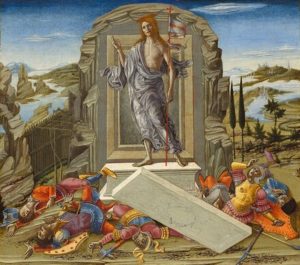CHARITY THE NEW LIFE OF EASTER – YEAR C
Resiliency is the key to love – Maya Angelou
(Acts 10:34, 36-43; Col 3:1-4; Jn 20:1-18)
**********************************************
We know that Christ has risen from the dead because, despite all death and wounds, love exists and love continues in the world. Charity is the new life of Easter.
What is meant by that – charity is the new life of Easter?
 Maya Angelou is the Black American poetess who spoke at Bill Clinton’s inauguration. When she was 7 years old, she was raped by a neighbor. She told her grandmother, who called the police. Her assailant was arrested and put in prison. Criminals within prisons have their own codes and one of them is that sex offenders are themselves often tortured and killed by fellow inmates. This was the case for her attacker. Soon after his arrest he was murdered by his fellow prisoners.
Maya Angelou is the Black American poetess who spoke at Bill Clinton’s inauguration. When she was 7 years old, she was raped by a neighbor. She told her grandmother, who called the police. Her assailant was arrested and put in prison. Criminals within prisons have their own codes and one of them is that sex offenders are themselves often tortured and killed by fellow inmates. This was the case for her attacker. Soon after his arrest he was murdered by his fellow prisoners.
Angelou’s seven-year-old mind and heart, already severely traumatized by the rape, was not able to deal with this. Quite naturally, she blamed herself for this man’s death. The effect of this was so severe that for the next nearly 10 years she was unable to speak. She was put into special schools, seen as handicapped, retarded, abnormal – with all that psychological and social havoc this wreaked. It is hard to imagine a more wounded and broken childhood then hers.
But she recovered, learned to speak again, and eventually has become a gifted speaker, opera singer, writer and poet. More importantly, she has become a woman of rare vibrancy, zest, graciousness, style, warmth, gratefulness, faith and love – complete with an exceptional sense of humor and delight. Looking at and listening to the Maya Angelou of today, it borders on the impossible to believe that she is the same person who endured her own childhood.
When she speaks, she tells you her secret is faith. But hers is a particular kind of faith, a faith in the resurrection. She has her own, one-line, wording for this: resiliency is the key to love.
Her faith is in contrast to an old Joan Baez, civil war song from the sixty’s, called “The Night They Drove Old Dixie Down”. The singer is telling the story of her brother, killed in the war. It’s a beautiful song, expressing a deep melancholy that is full of a noble stoicism, but contains nothing of hope. Her young brother is dead, killed senselessly in war:
He was just eighteen, proud and brave,
When a Yankee laid him in his grave.
I swear by the mud below my feet,
You can’t raise a Caine back up when it’s in defeat.
Maya Angelou’s story awakens in us the central truth of our faith: You can raise life back up when it’s in defeat! There is resurrection and this puts all wounds and death into a completely different focus. It also calls on us to move beyond our wounds and our deaths. Resiliency is the key to love.
Stories like Maya Angelou’s are proof of the resurrection, proof that the grave of Christ was empty, proof that love is more resilient than the many things that crucify it. Love and laughter go on. Charity is the new life of Easter.
I believe that Jesus is resurrected from the dead because of the many Maya Angelou’s that I have met. I have experienced charity, love, forgiveness and resiliency. I was present when a woman met with her sexual abuser, communicated to him with love her feelings about what happened as a way of trying to forgive him, went on to ask him to forgive her for how she had reacted in anger and hatred toward him for many years, then gave him a hug.
Yes, I have seen the new life of Easter. In Maya’s story, in our own stories, perhaps in your story, we see that dead bodies do rise from their graves, that dead voices do sing again, that abused bodies do delight again in joy, and that wounded spirits do grow strong again through forgiveness, and move on.
And that is the challenge of Easter, the challenge of the resurrection. It invites us to a new life of charity and resiliency. Faith in the resurrection is the only thing that can ultimately empower us to live beyond our crucifixions, beyond being raped, beyond being muted by wounds.
Someone once brought my attention to an Easter card which ended with the challenge: “May you leave behind you a string of empty tombs!” That is both my Easter wish and my Easter challenge for all of us. Let our wounded, muted voices begin to sing again: Christ is risen! Life is very, very good! Happy Easter!



